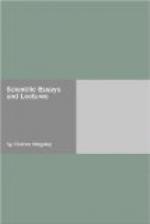Therefore it is that I hold, and hold strongly, that the study of physical science, far from interfering with an officer’s studies, much less unfitting for them, must assist him in them, by keeping his mind always in the very attitude and the very temper which they require.
If any smile at this theory of mine, let them recollect one curious fact: that perhaps the greatest captain of the old world was trained by perhaps the greatest philosopher of the old world—the father of Natural History; that Aristotle was the tutor of Alexander of Macedon. I do not fancy, of course, that Aristotle taught Alexander any Natural History. But this we know, that he taught him to use those very faculties by which Aristotle became a natural historian, and many things besides; that he called out in his pupil somewhat of his own extraordinary powers of observation, extraordinary powers of arrangement. He helped to make him a great general: but he helped to make him more—a great politician, coloniser, discoverer. He instilled into him such a sense of the importance of Natural History, that Alexander helped him nobly in his researches; and, if Athenaeus is to be believed, gave him eight hundred talents towards perfecting his history of animals. Surely it is not too much to say that this close friendship between the natural philosopher and the soldier has changed the whole course of civilisation to this very day. Do not consider me Utopian when I tell you, that I should like to see the study of physical science an integral part of the curriculum of every military school. I would train the mind of the lad who was to become hereafter an officer in the army—and in the navy likewise—by accustoming him to careful observation of, and sound thought about, the face of nature; of the commonest objects under his feet, just as much as the stars above his head; provided always that he learnt, not at second-hand from books, but where alone ho can really learn either war or nature—in the field; by actual observation, actual experiment. A laboratory for chemical experiment is a good thing, it is true, as far as it goes; but I should prefer to the laboratory a naturalists’ field-club, such as are prospering now at several of the best public schools, certain that the boys would get more of sound inductive habits of mind, as well as more health, manliness, and cheerfulness, amid scenes to remember which will be a joy for ever, than they ever can by bending over retorts and crucibles, amid smells even to remember which is a pain for ever.
But I would, whether a field-club existed or not, require of every young man entering the army or navy—indeed of every young man entering any liberal profession whatsoever—a fair knowledge, such as would enable him to pass an examination, in what the Germans call Erd-kunde—earth-lore—in that knowledge of the face of the earth and of its products, for which we English have as yet cared so little that we have actually no English name for it, save the clumsy and questionable one of physical geography; and, I am sorry to say, hardly any readable school books about it, save Keith Johnston’s “Physical Atlas”—an acquaintance with which last I should certainly require of young men.




